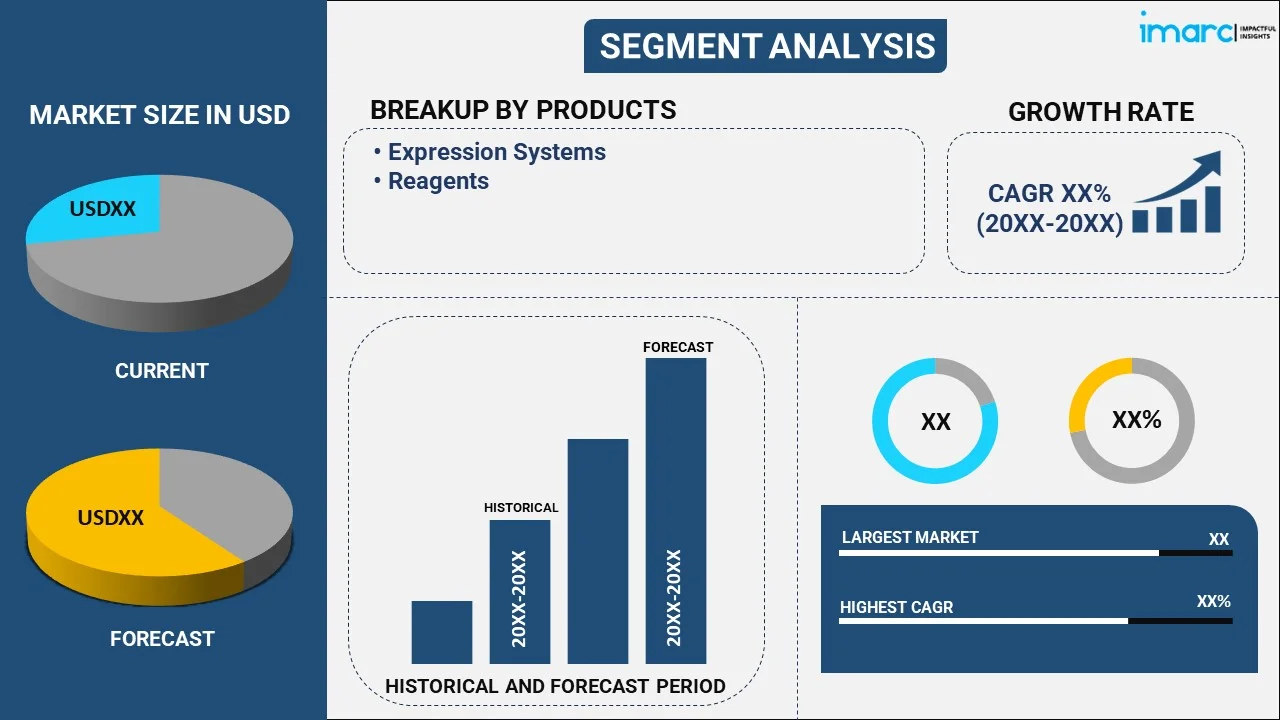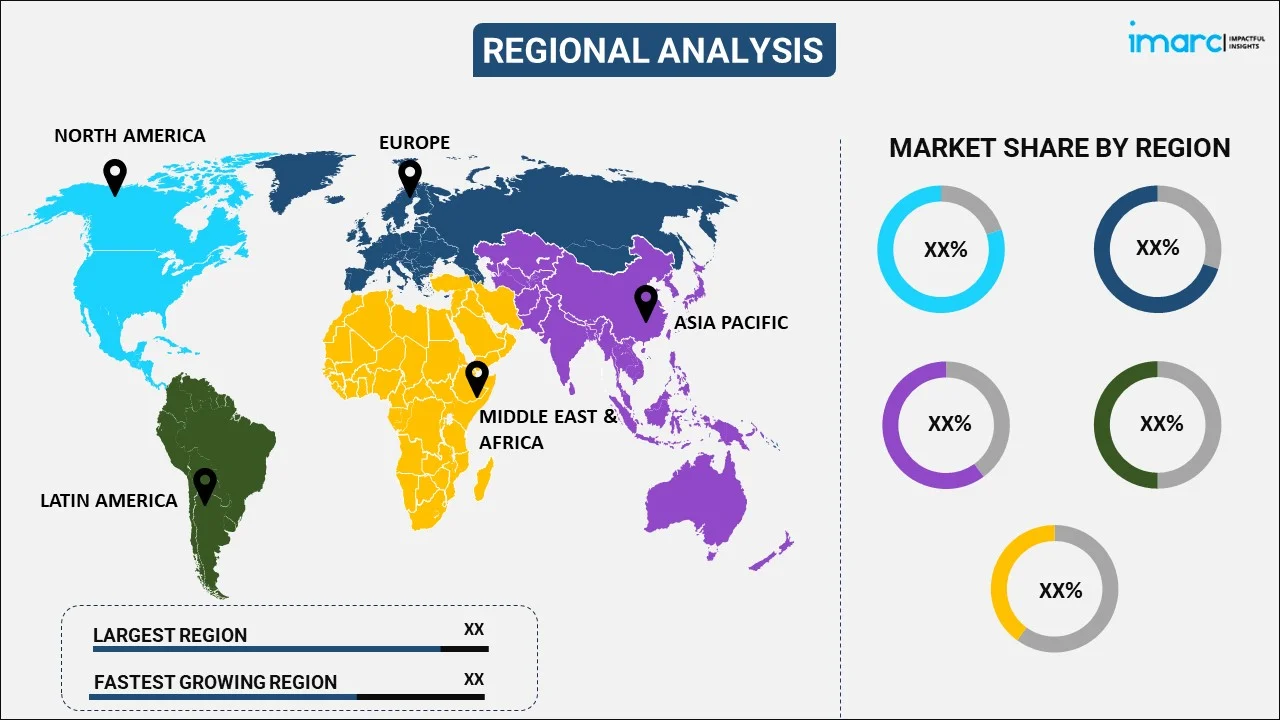
Cell-free Protein Expression Market Report by Product (Expression Systems, Reagents), Method (Transcription and Translation Systems, Translation Systems), Application (Enzyme Engineering, High Throughput Production, Protein Labeling, Protein-Protein Interaction, Protein Purification), End User (Pharmaceutical and Biotechnology Companies, Academic and Research Institutes, and Others), and Region 2025-2033
Market Overview:
The global cell-free protein expression market size reached USD 283.5 Million in 2024. Looking forward, IMARC Group expects the market to reach USD 515.1 Million by 2033, exhibiting a growth rate (CAGR) of 6.52% during 2025-2033. The market is experiencing significant growth mainly driven by advancements in personalized medicine, vaccine development, and synthetic biology. The rising demand for cost-effective, flexible solutions in pharmaceuticals and biotechnology further propels market growth, positioning CFPE as a key industry enabler.
|
Report Attribute
|
Key Statistics
|
|---|---|
|
Base Year
|
2024
|
|
Forecast Years
|
2025-2033
|
|
Historical Years
|
2019-2024
|
|
Market Size in 2024
|
USD 283.5 Million |
|
Market Forecast in 2033
|
USD 515.1 Million |
| Market Growth Rate 2025-2033 | 6.52% |
Cell-free protein expression (CFPE) refers to the production of desired recombinant proteins in solution using biomolecular translation machinery extracted from cells. It can be carried out using different cell lysates, such as E. coli, rabbit reticulocytes, wheat germ, insect cells, and mammalian cell-free protein expression systems. They are widely used in enzyme engineering, protein labeling, protein purification, protein-protein interaction, and high throughput production of mutants. CFPE is also used for analyzing components needed for protein stability, degradation, and folding. As compared to cell-based protein expression, cell-free protein expression is time efficient and convenient, allows the incorporation of non-natural amino acids, and provides enhanced stability and specificity.
Cell-free Protein Expression Market Trends:
Adoption in Synthetic Biology
Cell-Free Protein Expression (CFPE) has become a pivotal tool in synthetic biology, enabling scientists to design and engineer complex biological systems with enhanced precision. These platforms allow for the rapid prototyping of genetic circuits, facilitating swift iterations and optimizations without the limitations of living cells. CFPE also supports the testing of intricate biosynthetic pathways, accelerating the development of novel metabolic routes for producing valuable compounds. Furthermore, the ability to create and modify proteins with specific functionalities in a controlled, modular environment enhances innovation and versatility in synthetic biology projects. This combination of speed and flexibility is crucial for advancing research and developing cutting-edge biotechnological applications. Advancements in synthetic biology technologies are contributing significantly to the cell-free protein expression market growth.
Increased Use in Protein Engineering and Drug Development
The rising use of cell-free systems in protein engineering and drug development is transforming the pharmaceutical landscape. These systems enable rapid, high-throughput screening of protein variants, accelerating the identification of optimal therapeutic candidates. By eliminating the constraints of living cells, CFPE facilitates the production of challenging proteins, such as membrane-bound or toxic proteins, which are often difficult to express in traditional systems. This capability enhances the development of novel vaccines and biologics, allowing for precise modifications and optimization of protein structures. Additionally, cell-free platforms streamline the iterative design-build-test cycles, significantly reducing development time and costs. In line with this, in October 2024, Nuclera secured $75 million to commercialize its eProtein Discovery™ system, streamlining protein expression and purification for drug discovery. The funding, led by Elevage Medical Technologies, aims to enhance protein production efficiency in research labs, significantly reducing timelines from months to under 48 hours. These advancements are set to increase cell-free protein expression market share, as innovative technologies and substantial investments drive the growth and adoption of CFPE systems across the pharmaceutical industry.
Expansion in Vaccine Production
The demand for rapid vaccine production, particularly highlighted during the COVID-19 pandemic, underscores the significant advantages of Cell-Free Protein Expression (CFPE) platforms. CFPE systems facilitate the swift development of vaccine candidates by enabling the efficient synthesis of recombinant proteins and mRNA-based vaccines without the constraints of living cell cultures. This accelerates the timeline from design to production, allowing for quicker responses to emerging infectious diseases. For instance, in October 2024, LenioBio announced its partnership with ReciBioPharm to enhance vaccine production using its protein expression technology. This collaboration aims to scale up protein manufacturing, aligning with CEPI’s 100 Days Mission to expedite vaccine development. Additionally, CFPE offers scalability and flexibility, making it easier to adjust production volumes based on demand. As new pathogens arise and the need for diverse vaccine types grows, CFPE’s ability to rapidly generate and modify vaccine components ensures a robust and adaptable manufacturing process, essential for global public health initiatives. These advancements and strategic collaborations are creating a positive cell-free protein expression market outlook across the globe.
Key Market Segmentation:
IMARC Group provides an analysis of the key trends in each sub-segment of the global cell-free protein expression market report, along with forecasts at the global, regional and country level from 2025-2033. Our report has categorized the market based on product, method, application and end user.
Breakup by Product:

- Expression Systems
- E. coli Cell-free Protein Expression System
- Wheat Germ Cell-free Protein Expression System
- Rabbit Reticulocytes Cell-free Protein Expression System
- Insect Cells Cell-free Protein Expression System
- Human Cell-free Protein Expression System
- Others
- Reagents
Breakup by Method:
- Transcription and Translation Systems
- Translation Systems
Breakup by Application:
- Enzyme Engineering
- High Throughput Production
- Protein Labeling
- Protein-Protein Interaction
- Protein Purification
Breakup by End User:
- Pharmaceutical and Biotechnology Companies
- Academic and Research Institutes
- Others
Breakup by Region:

- North America
- United States
- Canada
- Asia-Pacific
- China
- Japan
- India
- South Korea
- Australia
- Indonesia
- Others
- Europe
- Germany
- France
- United Kingdom
- Italy
- Spain
- Russia
- Others
- Latin America
- Brazil
- Mexico
- Others
- Middle East and Africa
Competitive Landscape:
The report has also provided a comprehensive analysis of the competitive landscape in the global cell-free protein expression market. Detailed profiles of all major companies have also been provided. Some of the companies covered include:
- Bioneer Corporation
- biotechrabbit
- Cambridge Isotope Laboratories, Inc.
- CellFree Sciences Co., Ltd.
- Creative Biolabs
- Cube Biotech
- GeneCopoeia, Inc.
- Jena Bioscience GmbH
- New England Biolabs
- Promega Corporation
- Takara Bio Inc.
- Thermo Fisher Scientific Inc.
Kindly note that this only represents a partial list of companies, and the complete list has been provided in the report.
Cell-free Protein Expression Market News:
- In June 2024, LenioBio GmbH and Labscoop LLC announced their partnership to enhance access to LenioBio's ALiCE® cell-free protein synthesis technology across North America. This collaboration aims to accelerate protein discovery and development, providing researchers with scalable solutions while leveraging Labscoop's extensive marketplace and logistics for efficient distribution and support in life sciences.
- In June 2024, Daicel Arbor Biosciences launched its next generation myTXTL® kits for cell-free protein expression, enhancing antibody discovery and protein engineering. The myTXTL Pro Kit offers high yield for various applications, while the Antibody/DS Kit supports robust antibody production. Both kits aim to streamline workflows and boost research efficiency.
- In March 2024, Tierra Biosciences, a California startup specializing in AI-driven cell-free protein synthesis, raised $11.4 million in Series A funding led by Material Impact. This funding, combined with prior seed and grant support, will help the company enhance its platform for rapid custom protein production.
Report Coverage:
| Report Features | Details |
|---|---|
| Base Year of the Analysis | 2024 |
| Historical Period | 2019-2024 |
| Forecast Period | 2025-2033 |
| Units | Million USD |
| Segment Coverage | Product, Method, Application, End User, Region |
| Region Covered | Asia Pacific, Europe, North America, Latin America, Middle East and Africa |
| Countries Covered | United States, Canada, Germany, France, United Kingdom, Italy, Spain, Russia, China, Japan, India, South Korea, Australia, Indonesia, Brazil, Mexico |
| Companies Covered | Bioneer Corporation, biotechrabbit, Cambridge Isotope Laboratories, Inc., CellFree Sciences Co., Ltd., Creative Biolabs, Cube Biotech, GeneCopoeia, Inc., Jena Bioscience GmbH, New England Biolabs, Promega Corporation, Takara Bio Inc., Thermo Fisher Scientific Inc., etc. |
| Customization Scope | 10% Free Customization |
| Post-Sale Analyst Support | 10-12 Weeks |
| Delivery Format | PDF and Excel through Email (We can also provide the editable version of the report in PPT/Word format on special request) |
Key Questions Answered in This Report
The global cell-free protein expression market was valued at USD 283.5 Million in 2024.
We expect the global cell-free protein expression market to exhibit a CAGR of 6.52% during 2025-2033.
The rising adoption of cell-free protein expression, as it is convenient, allows the incorporation of non-natural amino acids, provides enhanced stability and specificity, etc., is primarily driving the global cell-free protein expression market.
The sudden outbreak of the COVID-19 pandemic has led to the increasing utilization of cell-free protein expression for developing antibodies to combat the risk of the coronavirus infection.
Based on the product, the global cell-free protein expression market has been segmented into expression systems and reagents, where expression systems currently hold the majority of the total market share.
Based on the method, the global cell-free protein expression market can be divided into transcription and translation systems and translation systems. Currently, transcription and translation systems exhibit a clear dominance in the market.
Based on the application, the global cell-free protein expression market has been categorized into enzyme engineering, high throughput production, protein labeling, protein-protein interaction, and protein purification. Among these, protein-protein interaction currently accounts for the majority of the global market share.
Based on the end user, the global cell-free protein expression market can be segregated into pharmaceutical and biotechnology companies, academic and research institutes, and others. Currently, pharmaceutical and biotechnology companies hold the largest market share.
On a regional level, the market has been classified into North America, Asia-Pacific, Europe, Latin America, and Middle East and Africa, where North America currently dominates the global market.
Some of the major players in the global cell-free protein expression market include Bioneer Corporation, biotechrabbit, Cambridge Isotope Laboratories, Inc., CellFree Sciences Co., Ltd., Creative Biolabs, Cube Biotech, GeneCopoeia, Inc., Jena Bioscience GmbH, New England Biolabs, Promega Corporation, Takara Bio Inc., and Thermo Fisher Scientific Inc.
Need more help?
- Speak to our experienced analysts for insights on the current market scenarios.
- Include additional segments and countries to customize the report as per your requirement.
- Gain an unparalleled competitive advantage in your domain by understanding how to utilize the report and positively impacting your operations and revenue.
- For further assistance, please connect with our analysts.
 Request Customization
Request Customization
 Speak to an Analyst
Speak to an Analyst
 Request Brochure
Request Brochure
 Inquire Before Buying
Inquire Before Buying




.webp)




.webp)












